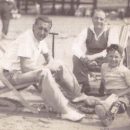School Life
Ronald Leedham: Oliver Twist and donk
Ronald Leedham was born in 1929 in India. His family moved back to England in 1931after Ronald contracted Polio. Ronald spent some years in Hospital as a young child after contracting Diptheria. When he was six he returned home to Catford for a short while to live with his father, eventually ending up living in ‘homes for crippled children’ run by the Shaftesbury Society, until he was sixteen.
More from
Ronald Leedham
- Geography
- A Miserable Time
- The Glow over London
- Suitcases
- Incendiaries in the park
- Dogfight
- Home
- Sheltering in the Church
- Oliver Twist
- Buzz Bombs and Doodlebugs
- Greyness
- Difficult subject
- War starts
- Awful Sundays
- Cricket at Sevenoaks
- Beatings
- Parlour Songs
- No talking
- Shelter
- Visiting every six weeks
- ‘Mummy coming’
- Visits
- Shame
- I Knew Nothing About Life
- Boys and girls together
- Mum
- The Walk to Church on Sunday
- Certificates
- Explosives
- Shut Away and Tipped Out
- Lead Soldiers
Here Ron describes asking for more jam.
Transcript
We only had two slices of bread for tea, I’ll always remember thatand jam. Jam was in an ordinary common or garden saucer with a spoonful of jam bonked down in the middle of it and that had to serve ten boys with two slices of bread, what we called donk. It wasn’t bread, it was donk, two slices of donk each. And we got very adept at spreading jam on bread and scraping it off again so that you had enough for the next slice, after you impregnated the first slice and this was a bone of contention with us kids, there was never enough jam, it never worked and there was a lot of moaning and groaning and somebody, I hope it wasn’t me, said we ought to complain about this.And we organised it for a particular day.I’ll always remember, it was a lovely sunny day and I could feel the tension, I was at the head of the table cos I was a prefect, you see, I was at the head of the table and all the boys were down either side and there were five of these tables in this room and the staff table was at the other end of the room and the staff table was a magnificent table and it was ginormous with a snow white cloth on it, we only had boards on the top of ours, you know and they had this snow white cloth and there was all the silver cutlery and there was pot plants on there and there were plates of cakes and thin sliced white bread, oh dear, thin slices of bread, cakes and this, that and the other, you know and oh, teapots, silver teapots. How they could do it in front of us, I do not know. Ours was real workhouse, talk about workhouse brats, ours was a real workhouse type situation, from one end of the room to their opulence. Like a film set this table was. Anyway, the time came..and I’d been opted to go up and complain and there was this tension around all the kids, they kept looking at me and I was trying to pluck up courage to go up and do this but eventually I had to go and I picked up this saucer and I thought, right I’ve got to do it, I’ve got to do it and everybody went quiet. cos normally the noise in there was absolutely frightful.
I stood up with this blooming saucer and there was this horrible hush and everybody..all the heads turned round and watched me as I walked up to the master at the head of his table, the superintendent. There’s me walking up to the table. He said, 'Yes, Lew, what’s the matter?' I said, 'We haven’t got enough jam here, sir, for ten boys.' I said, 'Can we have some more?'And he looked at me and all the masters’ heads came up, and the matron at the other end and he said, 'Well why, what’s the matter?' I said 'There’s not enough here for ten boys, sir, can we have some more?' 'Oh I don’t know, I don’t know' he said, 'Don’t you know there’s a war on?' I said, 'Yeah but look at what you’ve got' I said, 'You’ve got plates of cakes and this, that and the other,' I said. 'There’s ten of us with a little bit of jam like this.' I said 'It’s not enough.' And of course everybody... I don’t think there was a closed mouth in the room. But anyway, I let go, I really let go, I’ll always remember that, I let go and he was very embarrassed.
He said, 'OK, Lew, well you go and sit down and we’ll see what we can do about it.' I went and sat down again and I can’t remember what happened immediately after then but nothing happened. I thought I was gonna get called into the office and given a good walloping but he didn’t say anything at all. His attitude to me didn’t change, the staff attitude didn’t change, they didn’t seem to sort of avoid me or harass me in any way or anything like that. I wasn’t told off, there was no punishments cos the usual punishment if you did something wrong was a question of silence. The whole table had to sit silent until they said you could talk, which might have been a month and there was no reaction at all. I don’t think we had any more jam.
Explore more
Explore stories by theme or view the timeline of significant events in education for disabled people
![How Was School? [logo]](https://howwasschool.allfie.org.uk/wp-content/themes/hws-base-theme/assets/img/allfie-logo-original.svg)



